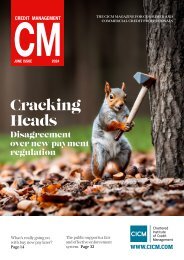CM September 2020
The CICM magazine for consumer and commercial credit professionals
The CICM magazine for consumer and commercial credit professionals
Create successful ePaper yourself
Turn your PDF publications into a flip-book with our unique Google optimized e-Paper software.
INTERVIEW<br />
SMALL TALK<br />
Satago CEO Sinead McHale talks<br />
cashflow, behavioural informatics and<br />
the survival of small businesses.<br />
AUTHOR – Sean Feast FCI<strong>CM</strong><br />
AS businesses navigate their way<br />
out of lockdown, many will<br />
question how they can continue<br />
to prosper amidst a backdrop of<br />
economic uncertainty. Sinead<br />
McHale, CEO of award-winning<br />
fintech Satago, believes that technology will<br />
play an essential supporting role in the months<br />
ahead.<br />
Since starting her career in finance, Sinead<br />
has held senior management roles in New<br />
York, Dublin and London across a variety of<br />
industries including banking, investment funds,<br />
and alternative business finance. She holds<br />
a master’s degree in Strategic Management<br />
Accounting, giving her a unique perspective<br />
on small businesses, their relationship with<br />
their accountants and their cash management<br />
challenges.<br />
Founded in 2012, Satago leverages behavioural<br />
informatics, artificial intelligence and open<br />
banking to provide credit control, risk insight<br />
and ethical and transparent single invoice<br />
finance for businesses and accountants.<br />
The survival of small businesses is a<br />
particularly pertinent topic for Sinead because<br />
as well as being a small business, Satago works<br />
for small businesses. The all-in-one cash<br />
management platform was designed to help<br />
SMEs avoid credit risks, get paid faster and<br />
cover cash gaps when they need to.<br />
“Good cashflow management will be essential<br />
if SMEs are going to survive the months ahead,”<br />
she says, ‘‘I believe that Satago is in the best<br />
position to help businesses navigate these<br />
difficult times. That’s one of the reasons I am<br />
delighted to be joining CI<strong>CM</strong> as a Corporate<br />
Partner at this time.”<br />
As part of their partnership, Sinead has<br />
offered all CI<strong>CM</strong> members free access to the<br />
Satago platform for three months. “I believe<br />
CI<strong>CM</strong> members will very quickly recognise<br />
the value and support that the platform can<br />
give them in managing their cashflow. Satago<br />
is proven to help businesses avoid credit risks<br />
and get paid faster, two things which will be<br />
essential as we exit lockdown.”<br />
Sinead has an impressive CV across various<br />
sectors of business and finance, having started<br />
her career in 1999 with the Equity Derivatives<br />
Group of Deutsche Group. Prior to joining Satago<br />
she was COO and then CEO of Clear Funding,<br />
unlocking working capital for SMEs. She has<br />
also accumulated an impressive number of<br />
qualifications, including a BSc in Economics<br />
from New York University, an MSc in Strategic<br />
Management Accounting from UCD Michael<br />
Smurfit Graduate Business School, and an ICA<br />
Post Graduate Diploma in Governance, Risk<br />
and Compliance from the Alliance Manchester<br />
Business School.<br />
It was primarily through growing up in a<br />
small family business in the West of Ireland,<br />
however, that Sinead learned to appreciate<br />
how important SME survival is for the families<br />
that rely on them, the communities where they<br />
operate and, of course, the economy.<br />
“During my career I have witnessed firsthand<br />
how SMEs can be ignored by traditional<br />
lenders, often to their detriment. Satago aims to<br />
reverse that trend, giving SMEs access to fast,<br />
reliable funds when they need it via our single<br />
invoice finance facility.”<br />
COLLECTIVE LOSSES<br />
A survey by Hitachi Capital suggested that in<br />
2019, small UK businesses lost a collective total<br />
of £51.5bn due to late payments. That number<br />
was unacceptable before coronavirus struck.<br />
Now, it could be devastating.<br />
Sinead believes that effective risk insight and<br />
credit control will be critical in the months<br />
ahead as companies seek to reduce the burden<br />
of late payments.<br />
“In my opinion, the cost of late payments<br />
is one of the biggest threats the UK economy<br />
faces in <strong>2020</strong>,” she says. “As the Government’s<br />
coronavirus support schemes wind down,<br />
the rate of insolvency and bad debt threatens<br />
to increase dramatically, thereby disrupting<br />
supply chains, restricting growth and ultimately<br />
threatening the survival of smaller enterprises.<br />
“The main reason why small businesses fail<br />
is because they don’t have access to cash, and<br />
a key reason for this is that they’re not being<br />
paid on time,” Sinead continues. “It’s essential<br />
that we tackle this issue head on. Businesses<br />
already spend a lot of time and money chasing<br />
late payments. This is stressful enough in itself<br />
without the backdrop of having a large debtor<br />
book outstanding, plus the fact that many<br />
small businesses have had to stop trading<br />
Advancing the credit profession / www.cicm.com / <strong>September</strong> <strong>2020</strong> / PAGE 44


















